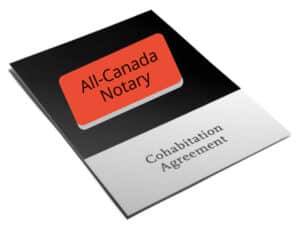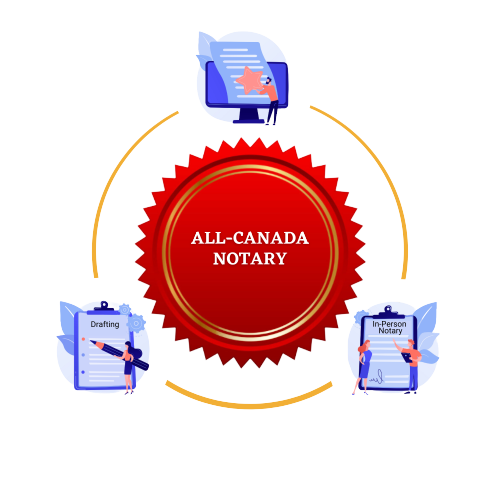If you have just moved in with your significant other or planning to move in with them while you take things slowly before getting married, that’s fabulous. Still, it would help if you considered having a cohabitation agreement prepared immediately.
Legally your situation is known as a common-law relationship, and while you both live together, sadly, you are not afforded the same protection given to married couples. In the event of a separation, getting a proper formula to apply to the division of the assets they have both acquired could become challenging. To forestall this ugly situation, you need a cohabitation agreement that helps you handle the murky waters after a separation.
How long do you have to live together to be common law in Canada?

In Canada, the definition of common-law relationships varies by province and territory. The federal government recognizes common-law relationships for the purposes of federal laws and programs after 12 months of continuous cohabitation. However, some provinces and territories have their own rules regarding common-law relationships for the purposes of provincial laws, such as property division and spousal support.
Here are the rules of regarding common-law relationships for some provinces and territories:
- Ontario: two people who have continuously lived together for 3 years and above or one year if there is a child together
- Alberta: 3 years of continuous cohabitation or having a child together.
- British Columbia: 2 years of continuous cohabitation, or less if there is a child together or one partner has made a significant contribution to the other’s property or finances.
- Saskatchewan: 2 years of continuous cohabitation, or less if there is a child together
- Northwest Territories: 3 years of continuous cohabitation, or less if there is a child together
- Yukon: 2 years of continuous cohabitation, or less if there is a child together
What is a Cohabitation Agreement?
A cohabitation agreement is a legally binding contract signed by unmarried couples who live together or plan to do so. A cohab, as it is sometimes called, is just like a prenup, and it helps both parties establish laid-down financial agreements for their relationship.
A cohabitation agreement is beneficial when you both might purchase a house together. It clearly states the rights and responsibilities of both partners in the relationship.
Cohabitation agreements go a step further to detail how properties will be divided in the event of a breakup and other intricacies, such as:
- How household expenses will be paid;
- How property purchased together will be divided;
- How debts accruing from the union will be shared;
- Whether alimony will be paid; and
- How to divide the inheritance if the families are combined.
Generally, laws for common-law relationships such as this are regulated by provincial and territorial laws. The agreements can include any vital factor to aid you and your partner in managing events if things fall apart.
In some parts of Canada, the cohabitation agreements drawn up can encompass wide ranges as long as they are not unfair or prejudicial.
What Are the Elements of a Cohabitation Agreement?
A cohabitation agreement will contain the following components;
- Basic information, including names, addresses, and occupations of parties.
- Cohabitation details such as the rights and obligations of each partner, sharing ratio for expenses, and sharing ratio for properties and tasks.
- Separation details like spousal support, debt repayment, and division of properties and assets.
- Any other special clauses specific to your circumstances as long as no laws are violated.
Can I Update My Cohabitation Agreement?
Yes, you can update your cohabitation agreement at intervals to ensure it reflects the current situation between you and your partner and that it has been fair to both parties.
Most couples insert a review clause that triggers the need to review or update the document.
Events such as the birth of a child, marriage, or if a partner receives an inheritance; could serve as triggers for a review.
How Do I Get a Cohabitation Agreement?
When you need a cohabitation agreement, you should consult professionals knowledgeable in the laws of the various provinces you reside in before drawing up your cohabitation agreement.
Many provinces allow parties to draft their agreements using online templates, but we have seen cases where some of these drafts hold no legal value. Having an expert notary or lawyer draft your agreement is much more cost-effective and sensible. By so doing, the terms will be permitted and tailored to fit your specific needs.
Note that a valid cohabitation agreement must ensure both parties;
- Are adults with the legal capacity to give consent;
- Can give consent freely; and
- Have signed and dated the documents before a witness (Notary public).
What happens to you cohabitation agreement if you marry?
It varies depending on the province or territory. If you live in a province or territory that does not have specific legislation governing Cohabitation Agreements, such as Ontario or Quebec, the impact of marriage on your Cohabitation Agreement may depend on the terms of the agreement itself. For example, if your Cohabitation Agreement includes a provision stating that it will remain in effect even if you get married, it may still be valid after marriage.
How can you prove cohabitation?
Here are some ways that cohabitation can be proven in Canada:
- Joint Lease or Property Ownership: If you and your partner have joint ownership of a property or a joint lease agreement, this can be used as evidence of cohabitation.
- Joint Bills: If you and your partner share bills, such as utility bills or rent payments, these can be used as evidence of cohabitation.
- Joint Bank Accounts: If you and your partner have joint bank accounts or credit cards, this can be used as evidence of cohabitation.
- Witness Statements: Statements from friends or family members who can attest to your living situation can also be used as evidence of cohabitation.
- Affidavits: An affidavit is a written statement made under oath, which can be used as evidence in court. You and your partner can each provide an affidavit stating that you live together as a couple.
Things to consider when one person owns the house
When one person owns a house and their partner moves in, here are some key things to keep in mind when creating a Cohabitation Agreement:
- Ownership of the Home: The owner of the home should be identified in the Cohabitation Agreement, along with a clear statement that the ownership of the home remains with that person. It’s important to clarify that the partner who is moving in does not have any ownership rights in the home, unless they contribute to the mortgage or other expenses related to the property.
- Rent or Mortgage Payments: If the partner who is moving in will be contributing to rent or mortgage payments, this should be specified in the Cohabitation Agreement. It’s important to clarify whether these payments will be considered rent, mortgage payments, or a form of contribution towards the home’s equity.
- Maintenance and Repair: The Cohabitation Agreement should also specify which party will be responsible for the maintenance and repair of the home. This can include things like cleaning, repairs, and landscaping.
- Termination of the Agreement: The Cohabitation Agreement should include provisions for what will happen if the relationship ends. This can include how the partner who is moving out will be compensated for any contributions they have made towards the home.
Do I Need To Notarize Cohabitation Agreements?
While it is not required to notarize Cohabitation Agreement, but it is required to have it witnessed and signed in the presence of a lawyer or notary public to help ensure that the agreement is legally binding and enforceable.
Can You Notarize Cohabitation Agreement Online?
Yes! You can have your cohabitation agreement virtually witnessed. Currently, the Ontario Ministry of the Attorney General has permitted Notaries to virtually witness the signing of sworn statements and affidavits.
This is exceptionally helpful if you and your partner are usually busy and may need more time to schedule an in-person notarization. All you need to do is contact All-Canada Notary to draft and notarize your cohabitation agreement.
How Can All-Canada Notary Help You?
All-Canada Notary is a network of notary publics dedicated to ensuring notarization becomes easy, fast, secure, and accessible.
We can help you notarize your cohabitation agreement through our online or physical notarization services.
All-Canada notary drafts documents and operates physical and virtual notary services designed to fit your schedule. You can book an appointment with us today and have your agreement notarized online or visit any of our in-person locations any day to get it done.

